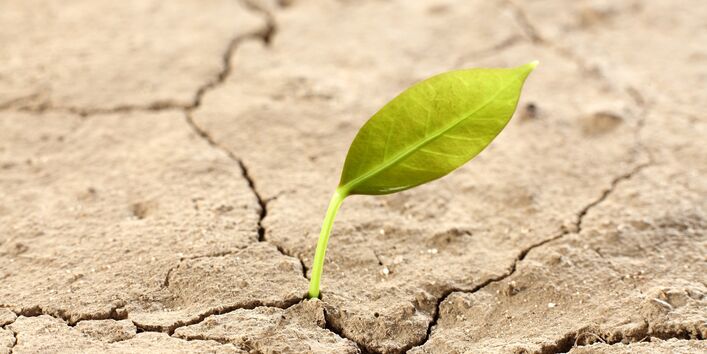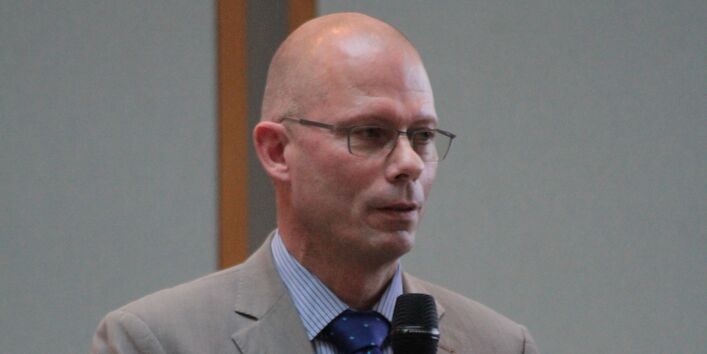Event to mark the end of the International Year of Soils 2015
An event to mark the end of the International Year of Soils 2015 was hosted in Berlin by the German Environment and Development ministries jointly with the German Environment Agency and the Deutsche Gesellschaft für Internationale Zusammenarbeit. Under the heading “Soil – A source of life”, experts and policymakers discussed old and new soil protection tasks and challenges.
2015 is the International Year of Soils. In September, Heads of State and Government adopted the Sustainable Development Goals (SDGs) at the UN General Assembly. Three of the goals explicitly address soil protection, the most important being to achieve a balance between soil degradation and restoration by 2030. The fertility of our soils is continuing to decline, and in Germany land-take for settlement and transport purposes continues at a rate of over 70 hectares per day. Germany must step up its efforts to counteract this.
In three keynote speeches, William Rees, Andrea Vettori and Alois Heißenhuber shed light on and discussed global, European and national soil aspects and drew attention to threats to soil and challenges for policymakers and society. You can find the presentations on the right side.
Some 10 million hectares of arable land are lost worldwide every year. One quarter of the earth’s land surface already contains significantly lower levels of humus and nutrients than it did 25 years ago or is no longer suitable for agricultural use. The main causes are deforestation including by slash and burn clearing, the conversion of grassland into arable land, and intensive agriculture not adapted to site conditions.
The sustainable development goal of curbing land degradation worldwide is the logical response to the threat of declining soil fertility.
Fertile, healthy soils are essential to our food supply. Soil degradation is thus also a cause of hunger and malnutrition - and consequently, of conflicts and migration.
“Better protection of soils, preventing erosion and desertification, fair access to land rights and markets, improved rural development, particularly in developing countries, all play a part in eliminating the root causes of people migrating from these parts of the world”, emphasised Stefan Schmitz, Special Representative of the special initiative of the Federal Ministry for Economic Cooperation and Development (BMZ) “One World, No Hunger”. The initiative is helping significantly to improve the global food situation, including through measures in the important field of action ‘protection and rehabilitation of agricultural soils for food security’.
Policymakers and scientists agreed that substantial progress must still be made not only globally but also at home.
If Germany wants to assume a leading role in the implementation of the soil-related SDGs, as it has announced, national policymakers must send out clear signals and give soil protection more weight.
“The revision of the German sustainability strategy is a major step in efforts to this end”, said Günther Bachmann, Secretary General of the German Council for Sustainable Development. As importer of animal feed (e.g. soya beans) and raw materials for renewable energy (e.g. palm oil), Germany benefits from soils from other parts of the world. That is why we need to take action in the framework of development cooperation and trade policy, since we bear responsibility for the sustainable use of soils in other countries from which we import consumer goods.
In the second part of the event, representatives of the parties represented in the German Bundestag were asked about other specific goals, measures and challenges: What global footprint does the way we conduct our economic activities leave? How can we use soil in a way that is in accordance with the sustainable development goals, what conditions must be established to achieve this and how do the parties intend to implement these requirements?
Finally, policymakers and scientists agreed that “halting soil loss and keeping access to land fair requires policymakers to send out clear signals. This also includes providing the sustainable development goals with measurable indicators and methods.” Doing so requires a description of soil status and of the trend of status change. The soil status report which UBA presented is a suitable compilation for Germany in this regard. However, the measures taken to achieve the goals will be key. We must allow our own use of soil to be judged against the global sustainable development goals.
The event in the Berlin office of the Federal Ministry for the Environment, Nature Conservation, Building and Nuclear Safety was filled to capacity.
The response showed that soil is everyone’s concern. The International Year of Soils has ended, but our work to protect soil must continue.

















